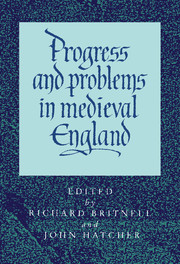Book contents
- Frontmatter
- Contents
- List of figures
- List of maps
- List of tables
- List of contributors
- Edward Miller: an appreciation
- List of abbreviations
- 1 Economic development in the early twelfth century
- 2 Lothian and beyond: the economy of the ‘English empire’ of David I
- 3 Boroughs, markets and trade in northern England, 1000–1216
- 4 Peasant deer poachers in the medieval forest
- 5 The growth of London in the medieval English economy
- 6 The bankruptcy of the Scali of Florence in England, 1326–1328
- 7 The English export trade in cloth in the fourteenth century
- 8 A medieval tax haven: Berwick upon Tweed and the English crown: 1333–1461
- 9 Taxation and communities in late medieval England
- 10 Peasants and the collapse of the manorial economy on some Ramsey Abbey estates
- 11 The famuli in the later Middle Ages
- 12 The great slump of the mid-fifteenth century
- 13 Lorenzo de' Medici's London branch
- 14 The trade of late medieval Chester, 1500–1550
- Bibliography of Edward Miller's published works
11 - The famuli in the later Middle Ages
Published online by Cambridge University Press: 05 June 2012
- Frontmatter
- Contents
- List of figures
- List of maps
- List of tables
- List of contributors
- Edward Miller: an appreciation
- List of abbreviations
- 1 Economic development in the early twelfth century
- 2 Lothian and beyond: the economy of the ‘English empire’ of David I
- 3 Boroughs, markets and trade in northern England, 1000–1216
- 4 Peasant deer poachers in the medieval forest
- 5 The growth of London in the medieval English economy
- 6 The bankruptcy of the Scali of Florence in England, 1326–1328
- 7 The English export trade in cloth in the fourteenth century
- 8 A medieval tax haven: Berwick upon Tweed and the English crown: 1333–1461
- 9 Taxation and communities in late medieval England
- 10 Peasants and the collapse of the manorial economy on some Ramsey Abbey estates
- 11 The famuli in the later Middle Ages
- 12 The great slump of the mid-fifteenth century
- 13 Lorenzo de' Medici's London branch
- 14 The trade of late medieval Chester, 1500–1550
- Bibliography of Edward Miller's published works
Summary
Itself much influenced by Edward Miller's study of the manors of the bishopric of Ely, Sir Michael Postan's celebrated pamphlet has remained for over forty years the only monograph devoted to the famuli, the staff of permanent workers on the medieval manors. Yet, as Postan realised, it was incomplete, terminating rather abruptly about 1300. ‘It would also be desirable’, he wrote, ‘to project the history of [the] thirteenth-century study to the point at which it touches upon the great transformations of the late fourteenth and fifteenth centuries.’ This present essay considers, however inadequately in the space available, the survival and importance of the famuli in the later Middle Ages, in particular during the half-century following the most devastating outbreak of bubonic plague, the Black Death of 1348/9.
Published in an ephemeral format, and long out of print, Postan's arguments are so central to this extension of his study that they must be outlined here. Whatever the earlier function of slaves in Anglo-Saxon society, at the time of the Norman Conquest, he contended, ‘they were manorial servants, permanent agricultural labourers’, primarily responsible for ploughing. A generation later, Domesday Book classed many of them as oxherds (bovarii), bordars or cottars, with the status not of slaves but of serfs, occupying smallholdings probably cut out of the demesne. During the twelfth century this change became general.
- Type
- Chapter
- Information
- Progress and Problems in Medieval EnglandEssays in Honour of Edward Miller, pp. 207 - 236Publisher: Cambridge University PressPrint publication year: 1996
- 3
- Cited by

